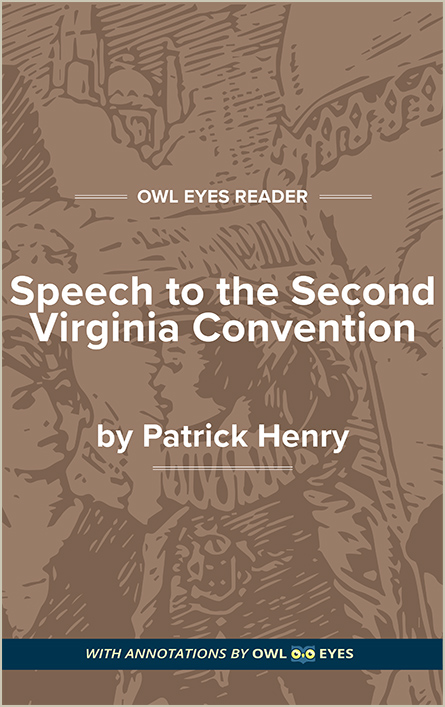Analysis Pages
Historical Context in Speech to the Second Virginia Convention
The Virginia Convention: After British Governor of Virginia, Lord Dunmore, dismantled the House of Burgesses—the first legislative body of representatives in the American colonies—the Burgesses reconvened with the First Virginia Convention. During this first convention, which took place at the Raleigh Tavern in August of 1774, the Burgesses elected Peyton Randolph as the Speaker of the House and made several sweeping changes, including ending trade with Britain. Later, on March 20, 1775, the Second Convention met at St. John’s Episcopal Church in Richmond, Virginia, in order to evade Lord Dunmore and the British army. At St. John’s, Patrick Henry swayed delegates to form a militia with his “Give Me Liberty or Give Me Death” speech. In addition, delegates elected a committee to prepare the thirteen colonies for war with Britain.
Lead-Up to the Revolutionary War: In an effort to repay the debt accrued during the French and Indian War, which ended in 1763, British Parliament passed a series of laws that taxed American colonists. American colonists believed that these laws—including the Sugar Act of 1764 and the Stamp Act of 1765, which taxed basic goods—infringed upon their basic rights. During the Boston Tea Party of 1773, colonists protested Parliament’s tea tax by throwing 46 tons of tea into the Boston harbor. American colonists did not believe it was their duty to repay a war fought by the British, nor did they believe that British Parliament should tax them unduly.
Text of Henry’s Speech: Henry rarely wrote down his speeches, preferring to improvise, which has frustrated historical scholars. His “Speech to the Second Virginia Convention,” although not transcribed at the convention, was later reconstructed by biographer William Wirt, who began collecting information and witness testimony from various founders nine years after Henry’s death. Because of this, there is debate on how much of the speech should be credited to Henry and how much should be attributed to Wirt’s sources and his own rhetorical skill.
Historical Context Examples in Speech to the Second Virginia Convention:
Text of Henry's Speech
🔒"There is a just God who presides over the destinies of nations, and who will raise up friends to fight our battles for us...." See in text (Text of Henry's Speech)
"when a British guard shall be stationed in every house?..." See in text (Text of Henry's Speech)
"gracious reception of our petition..." See in text (Text of Henry's Speech)
"ten years..." See in text (Text of Henry's Speech)
"to God..." See in text (Text of Henry's Speech)
"The question ..." See in text (Text of Henry's Speech)
"Is it that insidious smile with which our petition has been lately received?..." See in text (Text of Henry's Speech)
"Mr. President..." See in text (Text of Henry's Speech)
"the magnitude of the subject..." See in text (Text of Henry's Speech)
"I shall speak forth my sentiments freely and without reserve. This is no time for ceremony...." See in text (Text of Henry's Speech)
"the House..." See in text (Text of Henry's Speech)

